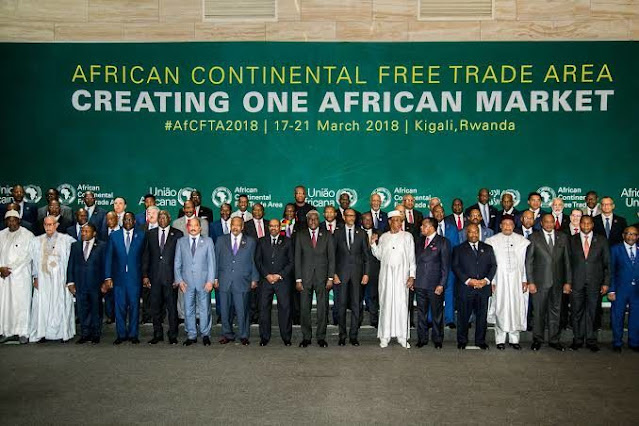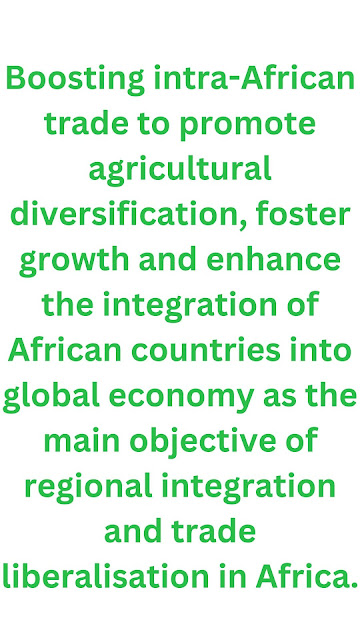- Get link
- X
- Other Apps
Featured post
- Get link
- X
- Other Apps
STRENGTHENING AND PROMOTING AFRICAN INTRA-TRADE FOR AGRICULTURAL DIVERSIFICATION, GROWTH, AND ENHANCED INTEGRATION OF AFRICAN REGION IN THE GLOBAL ECONOMY
MADE IN AFRICA: THE NEW DAWN
"Third world is a state of mind and until
we change our attitude as Africans if there is a fourth, fifth, and even sixth
world we will be in it.-Patrice L.O. Lumumba.
African intra-trade provides opportunities for
development and steady growth. It can reduce susceptibility to global shocks,
enhance export competitiveness, and create employment and economic
diversification. Boosting African intra-trade and supporting regional
integration will promote agricultural transformation hence bringing forth an
essential scope for economic diversification due to the linkages agriculture
has with other sectors paving the way for industrialization.
To accomplish agricultural transformation leaders need a prioritized strategy and a strong vision with clear and profitable programs. Implementation of strategies for the promotion of intra-African trade to help in agricultural transformation is determined by political economy, the ability to implement the required action, strategize, and navigate obstacles.
Intra-African trade: A path to economic diversification and inclusion
Spearing the enactment of common external tariffs at the continental level and coordinating these initiatives will help overcome the challenges brought forward by the overlapping membership of countries to two or more RECS. These will help in the harmonization and coordination of trade policies which paves the way for the continental-wide elimination of trade barriers such as tariff rates hence boosting agricultural trade and transformation within the continent.
The designation of key agricultural raw
materials such as textiles, and motor vehicles as sensitive products and hence
exclusion from liberalization is a hindrance to intra-African trade. To boost
intra-African trade and agricultural trade it is important to strategize in
decreasing the number of sensitive agricultural commodities considering the
internal supply response.
The Framework for Boosting Intra-African Trade in Agricultural Commodities and Services
The absence of transparency and unpredictability around trade policy provisions affect transaction costs hence creating uncertainty in market conditions and prices faced by exporters and importers. As a leader encouraging effective and transparent communication of African countries on important provisions related to import /export bans, quotas tariffs and rules of origin will help in the promotion of agricultural trade.
Opening private sector dynamism focuses on strengthening the private sector to unlock intra-African trade. To reap maximum developmental gains from regional integration and African intra trade a leader needs to place the building of domestic entrepreneurship at the forefront agenda for boosting interregional trade. This should also include a mechanism for dialogue between state and businesses to boost intra-African and agricultural trade and build productive capacity.
Expanding African Trade to Boost Growth and Reduce Poverty
Promotion of intra-African trade and
entrepreneurship addresses challenges such as weak inter-firm linkages, low
levels of competitiveness, rising levels of informality, the small size of
African firms, and lack of innovation capability presented by African
enterprise structure hence the need for policy actions to help in transitioning
firms from informal to formal economy. This requires government-funded
education on how to start a business and on the responsibilities and rights of
entrepreneurs, simplifying the process of obtaining business registration
permits and tax reductions.
Leaders should promote the growth of firms and upward mobility by providing better access to funds and business services, particularly for small and medium-sized entrepreneurs. The establishment of credit bureaus and registries reduces information asymmetry between lenders and borrowers hence easy access to finance for small and medium enterprises. Furthermore, developing the capacity of small and medium enterprises to meet the needs of large firms through training and provision of market information and business creates inter-firm linkages.
Intra-African trade is key to sustainable development – African Economic Outlook
It’s important to address constraints on
intra-African trade imposed by a lack of energy, communication, transport, water, infrastructure, peace, and security. Imposing the need for stronger
domestic resource mobilization on the continent and promoting private
investment into infrastructure through public-private partnerships.
Boosting intra-African trade to promote
agricultural diversification, foster growth, and enhance the integration of
African countries into the global economy is one of the main objectives of
trade liberalization and regional integration in Africa. However, going beyond
liberalization to create potential through diversification and establishment of
the continental free trade area. This will require strong political leadership
to guarantee close policy coordination, hasten the implementation of harmonized
procedures, and ensure equitable outcomes across countries.

%5B1%5D.jpg)


Comments
Post a Comment